Calvary Curriculum Children’s Ministry Conf.
Nurturing God’s Lambs—Experienced Leaders Offer Guidance and Encouragement for Children’s Ministries
Story by Margot Bass
Photos by Karl Ronstrom, Tom Price, and Jeremey Wilson
This story first ran in Summer 2019, Issue 80. Calvary Curriculum Children’s Ministry (CCCM) conferences were started in 1992 by Pastor Larry Enterline at Calvary Chapel Costa Mesa to encourage, equip, and challenge pastors, leaders, children's ministry, and youth teachers worldwide. The upcoming 2021 conference will be held February 19-20 at Calvary Chapel Golden Springs in Diamond Bar, CA. You can register for the conference, Hope for This Generation, at https://calvarycurriculum.brushfire.com/events/479940.
Some may doubt whether a small child can make a lasting commitment to Christ. Brian Renfrow was considered the “naughtiest kid” in his 5- to 6-year-olds’ Sunday school class at Calvary Chapel San Bernardino, CA. He was known to jump from chair to chair—or even from table to table—to demonstrate his athleticism, he recalled. “I was very high energy and hyper, a handful for sure.” The church’s ministry pastor, John Deming, was often called in to help manage the boy. “As a child, I could tell that John Deming was sincere. He had a way of making meaningful eye contact with each child and could communicate in a way they could understand.” At 6 years old, Brian accepted Jesus as his Savior. Today, at 35, he actively volunteers in ministry at CC San Bernardino, including Sunday school, worship, and missions.
Pastor Larry Enterline directed the children’s ministry at CC Costa Mesa, CA, under Chuck Smith for 10 years. Now the president and co-founder of Calvary Curriculum, he has taught about the incident in Mark chapter 10 when Jesus’ disciples misunderstood His heart for children. They rebuked parents for bringing children to Jesus so that He could touch them. But when Jesus saw it, He was greatly displeased and said to them, “Let the little children come to Me, and do not forbid them; for of such is the kingdom of God. Assuredly I say to you, whoever does not receive the kingdom of God as a little child will by no means enter it.” And He took them up in His arms, laid His hands on them, and blessed them (Mark 10:14-16).
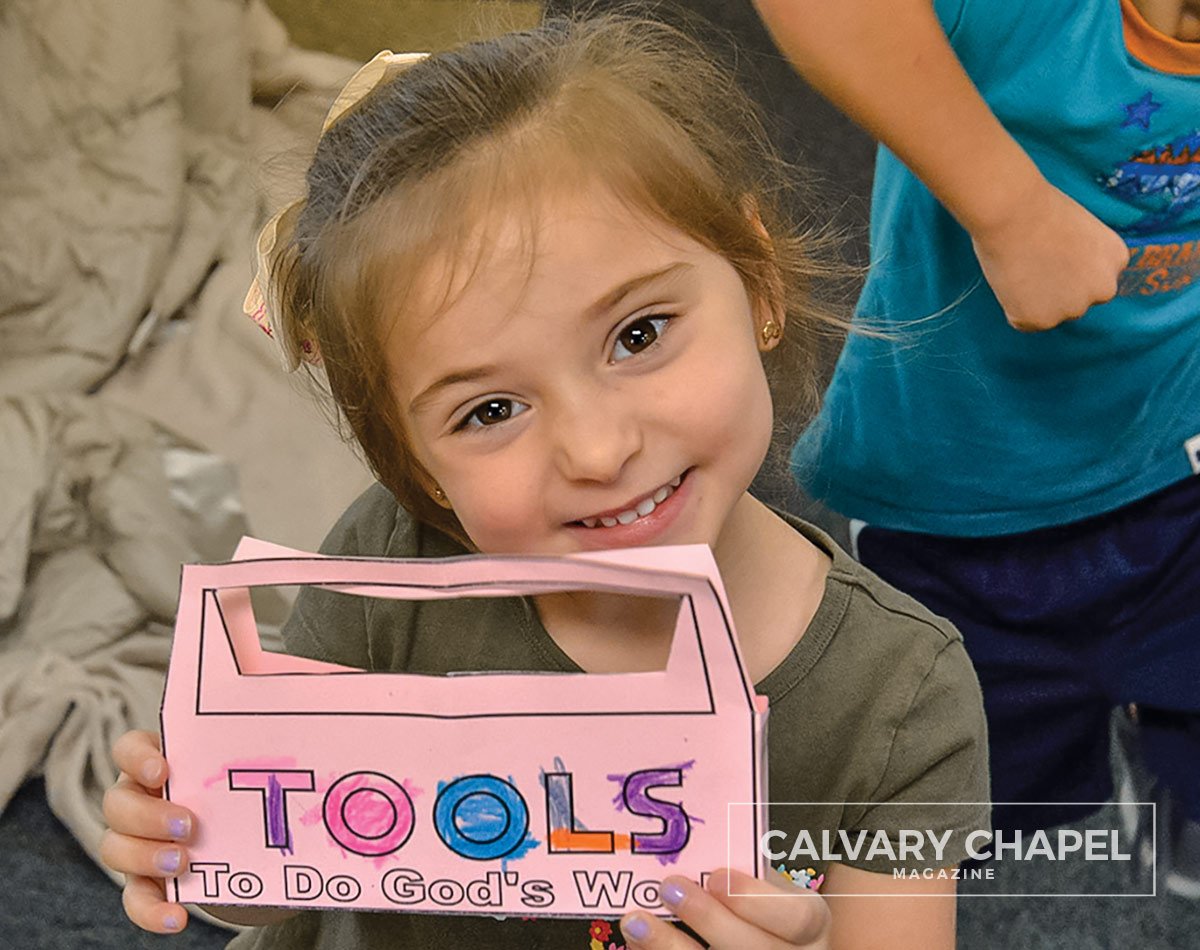
A little girl shows off a craft she made. Children’s ministry is not about passing on information but leading children directly to the throne room of God, then showing them what it means to walk with Him.
Larry affirmed, “Allowing a child to be brought to Jesus is the greatest act any church can do. We’re investing in the lives and eternities of children for God’s glory. We are protecting children, watching over them, and bringing up the generation to come.”
Calvary Curriculum (calvarycurriculum.com), which provides online children’s ministry training, help, curriculum, and Bible studies, held its annual conference (cccm-conference.com) in February 2019 at Calvary Chapel Golden Springs, CA. Featuring more than 80 workshops, bilingual Spanish and English teaching and worship—its theme was “Feed My Lambs.”
The following Q & A is based largely on the conference workshops. The responses come from Larry Enterline and his son Pastor Matt Enterline, vice president of Calvary Curriculum; John Deming, children’s ministry pastor, and Brian Renfrow, a Sunday school teacher at CC San Bernardino, CA; Ed Littell and Craig Arnhart, children’s ministry leaders at CC Chino Valley in Chino, CA; Steve West, children’s minister at CC Golden Springs, CA; and Justin Montoya, children’s minister at CC Greenmeadow, RI.
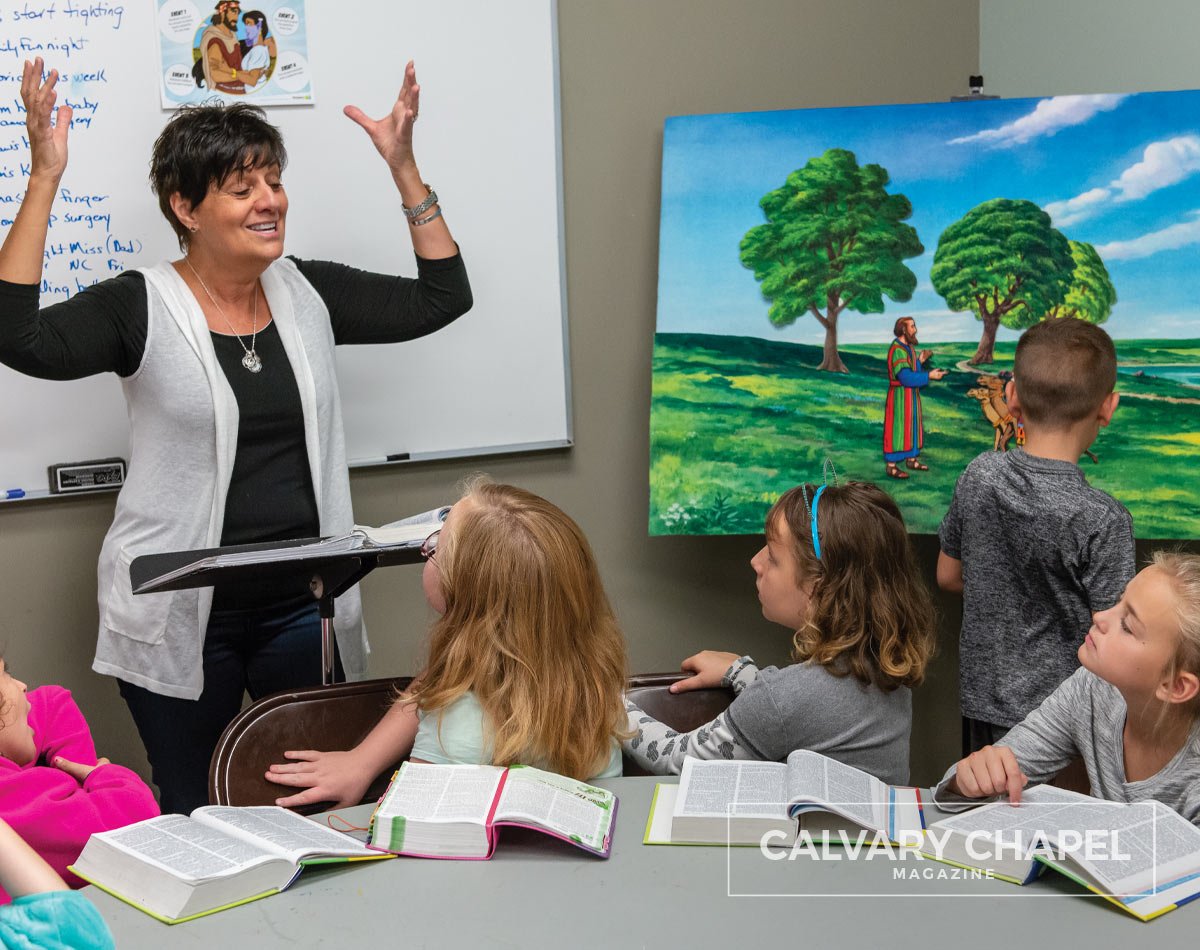
A woman eagerly teaches the Word of God to children in Sunday school.
What is the best way to reach children?
“A new commandment I give to you, that you love one another; as I have loved you, that you also love one another.” John 13:34
Larry Enterline: We want to give them God’s Word and disciple them, but above all else, love them. Let the love of Christ pour out to them through you. They need to see and sense that love. You love every child because they dwell in a world that often doesn’t love them. I’m convinced that when people have experienced the love of Christ, they’ll never be the same again.
John Deming: Convince them that you love them and are honored to be their teacher. As you become familiar with the children in the classroom and build personal friendships with each one, you will notice other benefits stem from that bonding: fewer disciplinary problems, a change from discipline to discipleship, and deeper times of sharing and learning.
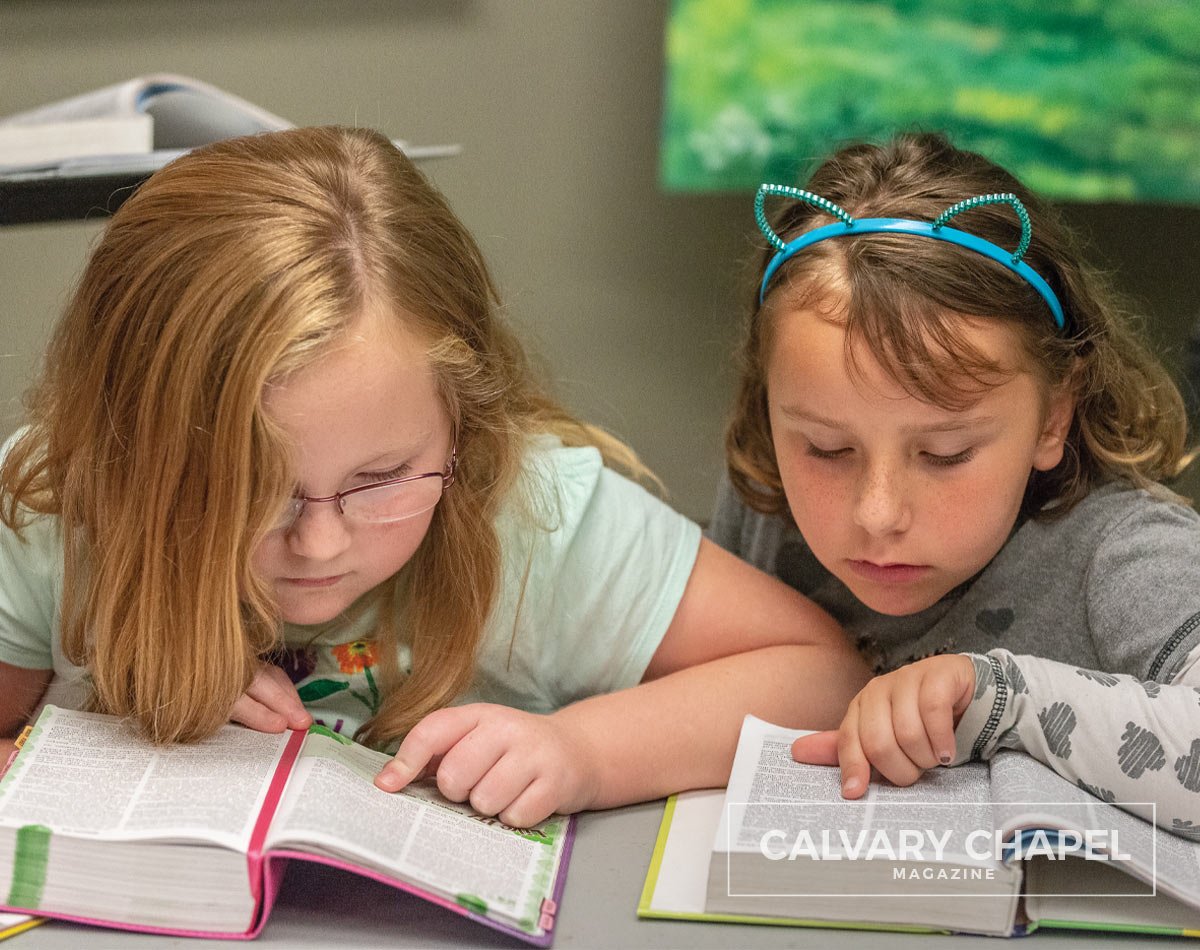
Two girls in Sunday school study the Scriptures. Children’s ministry leaders encourage teachers to teach and treat children as young people who can understand and learn.
Brian Renfrow: Make eye contact with and acknowledge a child when he enters your class. If he’s new, ask his name. You might get a shy child who doesn’t want to answer, but if you’re sincere, he’ll pick up on that. Get his name and commit it to memory. When you call a child by name, he knows that he’s important. Be real and be invested. I relate to children wherever they’re at—what’s cool for them and what it’s like to be their age.
John Deming: During the week, pray specifically for children by name. Listen to and learn something about each child; it’s impossible to meet their needs unless you know them. Their thoughts, hobbies, interests, and joys are relevant—don’t belittle them. Recognize birthdays by calling or sending a card. If a child misses a class, send him or her a note or make a call. In addition, greet every parent at the door. Parents are positively affected by a cheerful show of welcome and concern by the teacher. Say goodbye to every child in front of their parents at pick-up time. Share some joy from the class or pass on one of their children’s special qualities or contributions to the class. If the child has been naughty, share it lovingly.
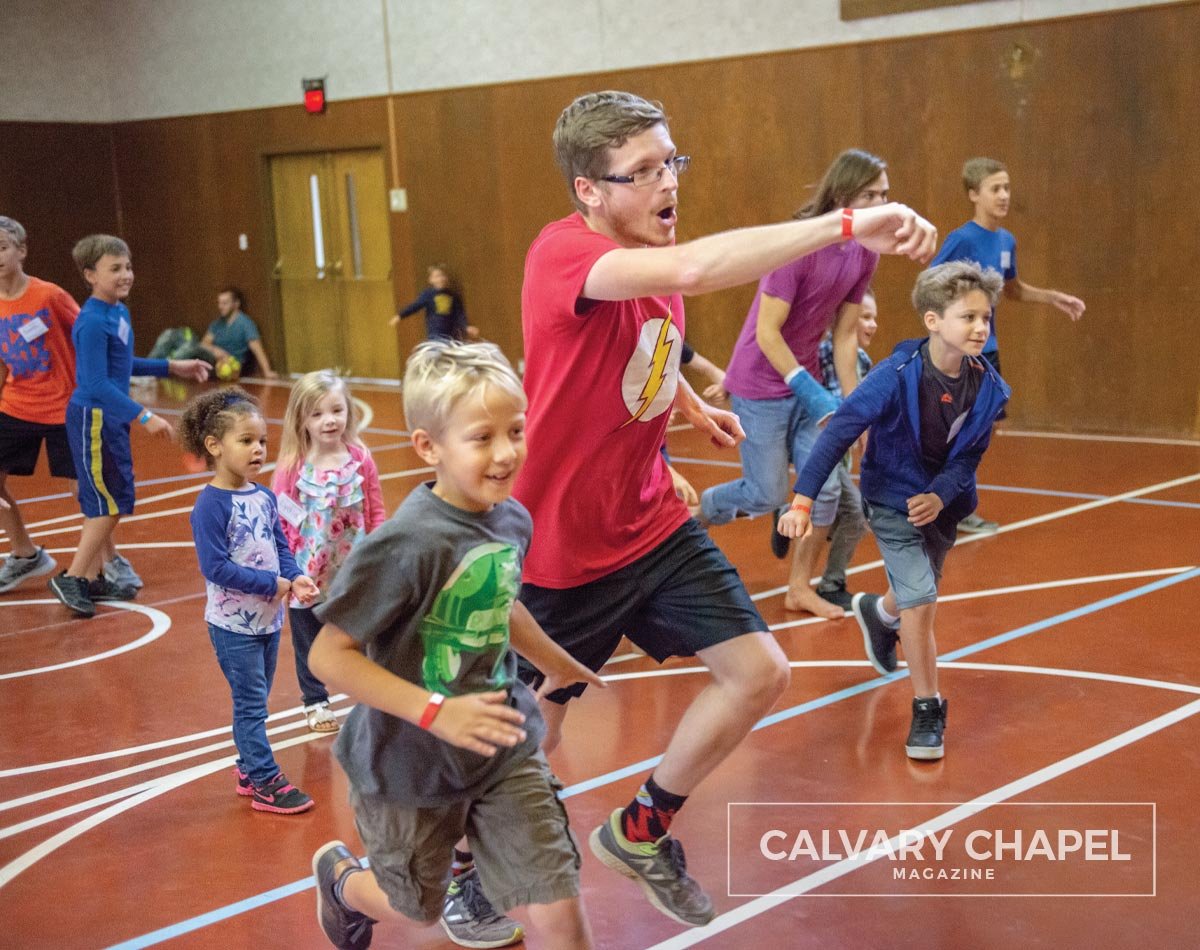
A young man actively participates in a game with children. Ministry leaders are urged to relate to children where they’re at and to build personal relationships with them.
My church is new to children’s ministry. What should I know?
Telling to the generation to come the praises of the Lord, and His strength and His wonderful works … That they may set their hope in God, and not forget the works of God, but keep His commandments. Psalm 78:4b, 7
Matt Enterline: The whole goal of children’s ministry should be to teach and lead children into what it is to have a personal relationship with Jesus Christ. It’s not necessarily to entertain them or fill time. We should point them to Jesus every moment. So many times, children’s ministries try to compete with the world’s fun and excitement. We’re not trying to compete. We have something greater—we can give children Jesus, and we know that won’t return void.
Craig Arnhart: Start simple and just get it going. Ask [yourself] if you’re starting it to have a good program or to please your Lord. If you’re doing the ministry for Him, to be a sweet aroma for the Lord, it’s going to be blessed.
Larry Enterline: It’s not about passing on information but about leading children directly to the throne room of God and then showing them what it is to walk with Him. Other information will come in during classes, but if Jesus isn’t the hub, all the information will have nowhere to go.
Justin Montoya: It’s important to approach children’s ministry as a team. It’s vitally important to share your passion for ministry and train others. This takes time, but as others see your willingness to lead from the trenches and stay faithful when things get difficult, there will be a strong sense of ownership among your volunteers. Every job, no matter how small, is needed and valuable. Young people have also jumped in to help.
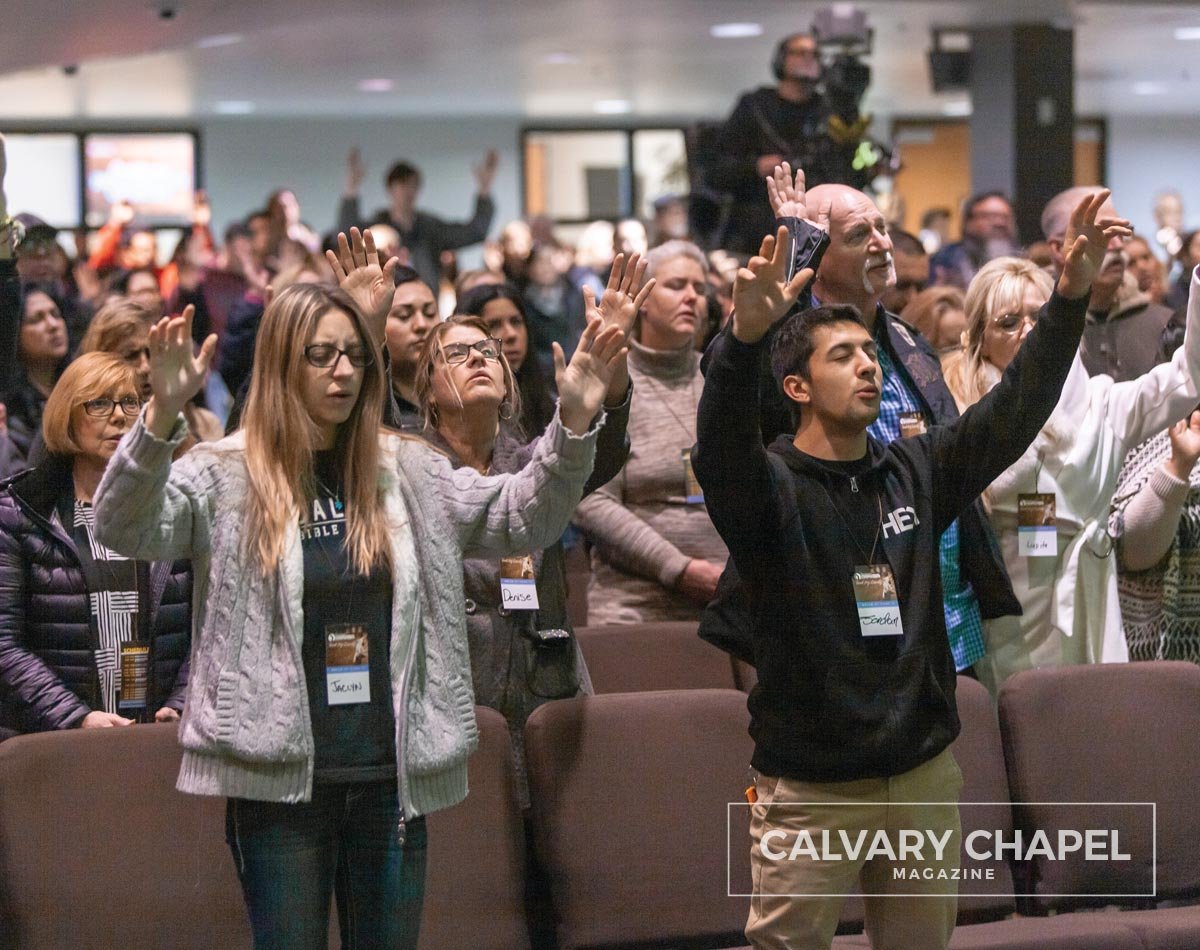
Attendees at the 2019 Children’s Ministry Conference worship in Spanish and English.
How can a ministry support its teachers?
Matt Enterline: Pastors and leaders are to be servants. If you don’t have the heart to be the first to arrive and the last to leave, maybe it’s not the ministry for you. You’re an example of Christ being faithful to that call. We’re here to make the teachers’ lives easier because they’re the ones sharing Christ with the kids. Strong support for teachers shows them that all they have to worry about is loving the kids and pointing them to Jesus.
Larry Enterline: Often, people don’t go into this ministry because they’re scared. Show them how to teach. Not all will be ready to get right in and teach, but they can be teamed up with someone who already has that experience. They can be brought in slowly so they can grow and continue to learn.
Matt Enterline: In choosing what children should study, consider the Gospels for the life of Jesus, Genesis as a foundation for the Bible, and Acts for Church history. Revelation gives them a future and a hope and is the only book that promises a blessing for reading it (Revelation 1:3). Use large-print Bibles in the classroom because children’s eyes are still developing. There’s nothing wrong with repeating curriculum year after year. It can be helpful to have all the classrooms do the same study. Families with children in different classrooms can go home talking about the same study, getting perspectives from different teachers. Send out emails every week with study helps. Don’t make teachers choose between volunteering and being spiritually fed in a service. Encourage the church to have two services, even if it’s a study for volunteers early on Sunday or on Saturday night.
How do we disciple children?
And that from childhood you have known the Holy Scriptures, which are able to make you wise for salvation through faith which is in Christ Jesus. 2 Timothy 3:15
Larry Enterline: After a child accepts the Lord, the Holy Spirit resides in him. Through the Bible, children come to know the person of God, to understand His love and steadfastness, to discern His character and care, and to know His will that they may be guided in their responses to Him in daily life. What children are taught goes with them through life.
Brian Renfrow: Connect lessons to them personally. In my 5th-6th grade classroom, I have kids read the Bible three verses at a time and then have them comment on how that applies to their lives. Children understand on all levels what adults understand—the moral application, the intellectual application, and that the Bible may be telling them something different than what they’re learning at school.
Larry Enterline: We need to teach and treat the kids like they’re people. Little people. They’re still young and lack vocabulary and life experience, but that doesn’t mean they can’t understand or learn. We need to define words and concepts as we teach them. Even in the salvation message, you have to be careful about asking the kids, “Do you want to be born again?” It can be confusing to children because they are very literal.
Craig Arnhart: Discipling can be done one-on-one or in groups. We’ve set up apologetics training (how to defend their faith) for the 4th-6th graders at our church. After worship, they’re learning apologetic facts for 10 minutes. We want them to know what God’s Word says because they’re in school and are being attacked with false teaching all the time.
Ed Littell: We have a four-week New Believers class for children who have accepted Christ as their Lord and Savior [to help them] grow in the Lord. The classes address their new relationship with God, His Word, discipleship, sharing faith, baptism and communion, and using their gifts in ministry. Give homework that parents and kids can do together. Award completion certificates.

Pastor Larry Enterline, president of Calvary Curriculum, addresses a crowd filled with children’s ministers and workers at the 2019 conference.
What are some of the greatest challenges in children’s ministry?
Justin Montoya: The reason children’s ministry is so difficult and invites spiritual warfare is because it’s so vital. I can think of no greater way to make a difference than teaching a child to have an authentic relationship with Jesus. Problems may be a sign we’re doing something right. After all, why would the enemy ever challenge a ministry that isn’t making an impact for God’s kingdom and fulfilling the Great Commission?
Matt Enterline: It’s a humbling experience leading a children’s ministry. You’re crying out to the Lord every day: God, I don’t know what I’m doing, and I need help. That’s the best place to be. If you go in thinking you have all the answers, it’s going to be tough.
Craig Arnhart: The greatest challenge is getting people to serve. In small churches, people get burned out because those few are the only ones doing the work. That church must place importance on the children’s ministry, and pastors must share the need from the pulpit.
Larry Enterline: We need to pray daily that God would bring those people He wants into the children’s ministry, and also that we would have eyes to see the people He wants there.
Justin Montoya: I’ve made many mistakes in my small church ministry, but I know I am simply to remain faithful to serve God through serving His kids. Children’s ministry can be messy. Volunteers don’t show up. Children misbehave, and I don’t always have as much time as I would like to invest in this important ministry. The temptation to quit is very strong and very real. One hectic Sunday as I drove home, I felt that I had failed. Then I remembered that children were, in fact, ministered to, that there were smiles and love to go around, and that God’s Word was taught. I sensed the Lord encouraging me to regroup, readjust, and stay the course.
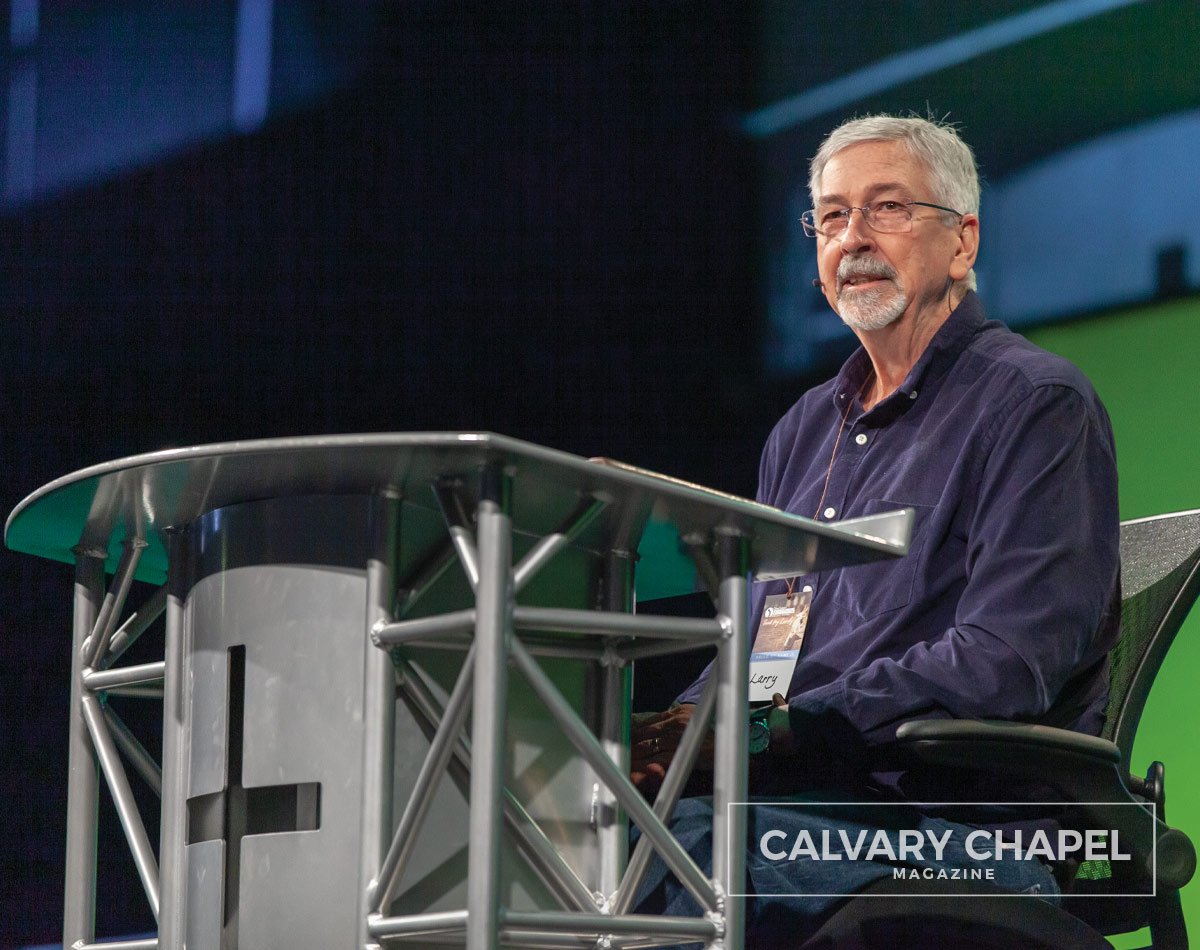
Larry Enterline started the first Calvary Curriculum Children’s Ministry Conference in 1992 to encourage, equip, and challenge leaders worldwide.
Craig Arnhart: A lot of kids come every other week because they are from broken homes. We must decide how we’re going to meet their spiritual needs when they may not have structure in their homes. We just have to be there for them.
Brian Renfrow: You’d love for all the kids to have a healthy, intact home life, each with parents who are reading the Word with them every night. But that’s not happening. When you discuss how God designed the family, be aware of how your words may impact children from broken homes. I see kids from those homes acting out. You find out over time what’s happened, then talk about it, one-on-one, with the child—it really tears down walls and builds up relational bridges. They start to respect you and know you care about them, even if one of their parents isn’t around.
www.cccm-conference.com
cccmc@calvarycurriculum.com
(951) 465-5507
You can register for the February 19-20 conference, Hope for This Generation, at https://calvarycurriculum.brushfire.com/events/479940.
All verses above are quoted from the New King James Version.
© 2020 Calvary Chapel Magazine. All rights reserved. Articles or photographs may not be reproduced without the written permission of CCM. All Scripture quotations, unless otherwise indicated, are taken from the New King James Version. Copyright © 1982 by Thomas Nelson, Inc.® Used by permission.